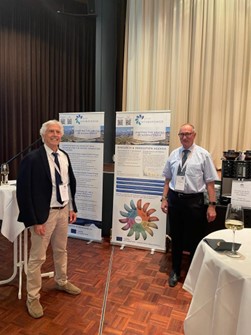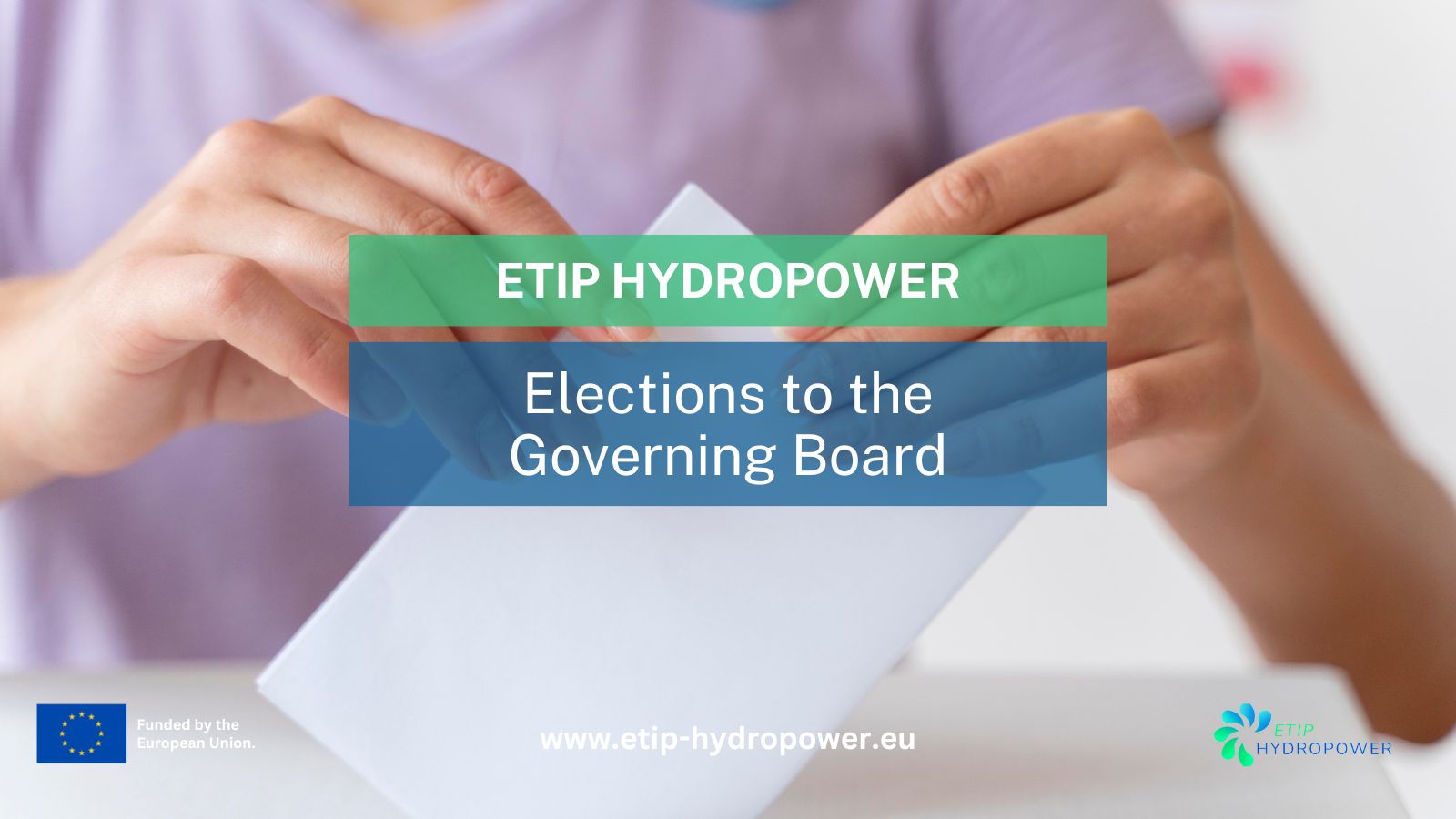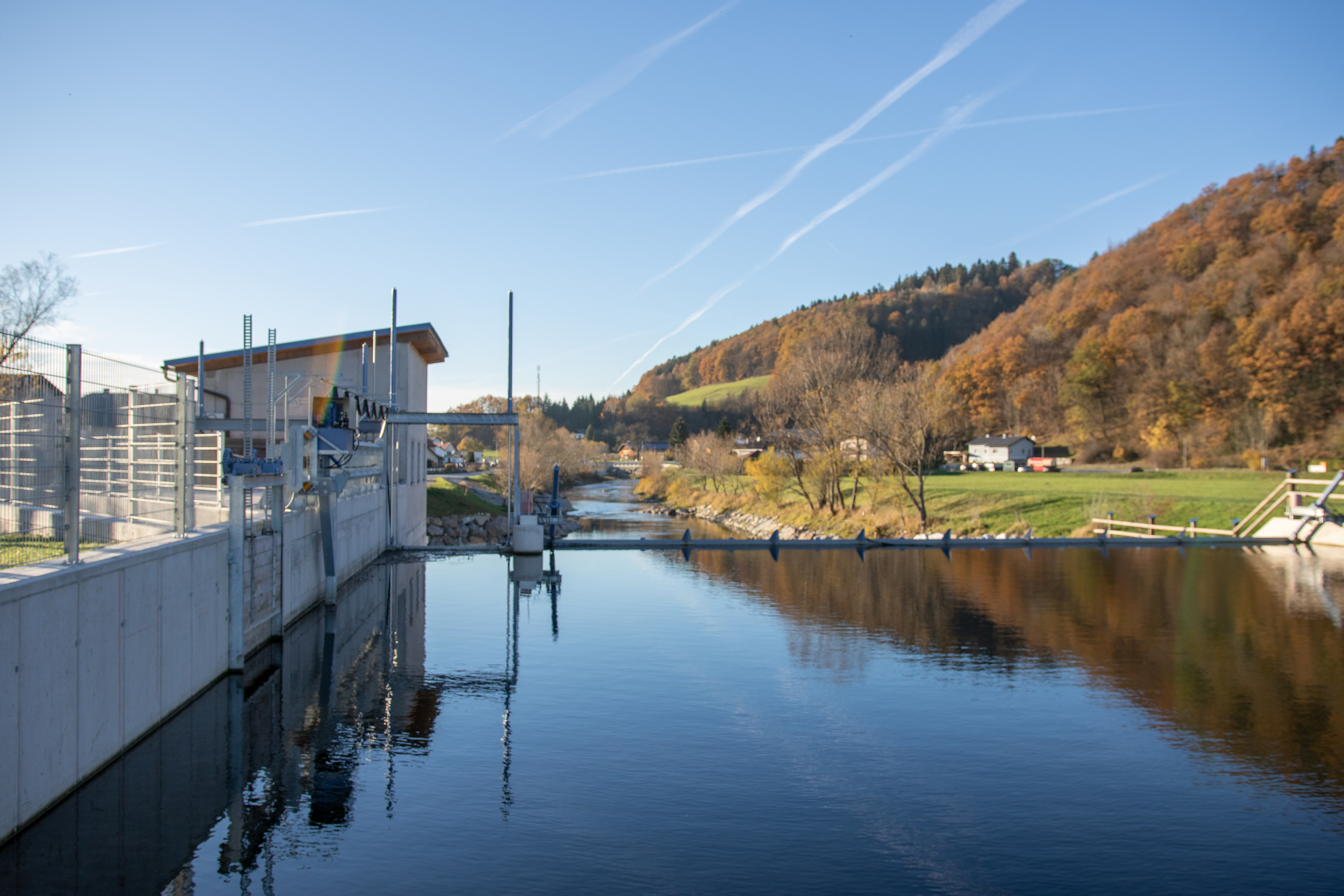UNIFYING THE VOICES OF HYDROPOWER
ICOLD European Club Symposium “Role of dams and reservoirs in a successful energy transition” - 5 September 2023, Interlaken (Switzerland)
Anton Schleiss, Jean-Jacques Fry, and Mark Morris from the ETIP HYDROPOWER Management Team contributed to the Symposium with the paper “Importance of hydropower reservoirs and dams in Europe to mitigate the energy crisis and to serve as a catalyst and enabler for the Green Deal”. Furthermore, ETIP HYDROPOWER was presented in the technical exhibition with 4 banners.
Access the paper HERE.

Governing Board Elections Process & Schedule for the ETIP HYDROPOWER
CONNECT TO THE CONSULTATION PLATFORM TO PARTICIPATE IN THE ELECTION PROCESS
In the realm of sustainable energy, hydropower stands as a beacon of hope, providing clean and renewable energy while mitigating environmental impacts. In the pursuit of harnessing the full potential of hydropower, the European Technology and Innovation Platform on Hydropower (ETIP HYDROPOWER) has embarked on a mission to establish a robust governance structure. Central to this structure is the Governing Board (GB), which will play a pivotal role in shaping the future of the hydropower sector in Europe. The path to constituting the Governing Board is characterized by transparency, inclusivity, and a commitment to diverse representation. Let's delve into the process and schedule for the Governing Board elections, which marks a significant milestone in the ETIP HYDROPOWER project. Step 1: Open Call for GB Membership Applications (4th - 9th October, 2023) The journey begins with an open call to members of the General Assembly, inviting them to apply for membership on the Governing Board. This call, issued through the ETIP HYDROPOWER platform, is a critical opportunity for passionate individuals to actively participate in shaping the hydropower landscape. Step 2: Processing and Review of Applications (11th - 13th October, 2023) After the submission deadline, the received applications, including CVs, will undergo meticulous processing. These applications will then be made accessible to General Assembly members for review via the ETIP HYDROPOWER platform. Step 3: General Assembly Voting (16th - 27th October, 2023) General Assembly members will cast their votes for their preferred Governing Board candidates. This process will take place entirely online through the ETIP HYDROPOWER Consultation Platform. Step 4: Announcement of Election Results (1st - 3rd November, 2023) Following the conclusion of the voting period, the election results will be officially announced. This pivotal moment will unveil the dedicated individuals who will take on the responsibility of steering the ETIP HYDROPOWER project forward as members of the Governing Board.
Call for Governing Board CandidatesThe ETIP HYDROPOWER initiative aims to unite stakeholders from various sectors—industry, academia, research, civil society, and sectorial associations—in a robust network prepared to address the challenges facing the hydropower sector. This network will harmonize and coordinate research and innovation strategies to offer consensus-based strategic advice to the SET Plan. This advice will encompass market analysis, research and development funding needs, biodiversity protection, and ecological continuity. The Governing Board aspires to represent a balanced view, with operators, industry representatives, and research communities forming its core. To achieve this equilibrium, the Governing Board will consist of 17-25 members distributed across seven stakeholder categories, each designed to ensure representation of the entire hydropower sector. These categories encompass:
Election Process OverviewElection of the Maximum of 17 Seats: In this phase, all submitted applications are considered, and General Assembly organizations vote for candidates within each stakeholder category to fill the initial 17 seats. As for voting, organizations, not individual professionals, hold voting rights. The number of votes an organization has depends on its size:
For any inquiries or clarifications regarding the election process, stakeholders are encouraged to reach out via info@etip-hydropower.eu . This transparent and inclusive process ensures that the Governing Board of ETIP HYDROPOWER represents the diverse voices and expertise essential for propelling the hydropower sector towards a sustainable and innovative future.
|
Global Renewables Alliance Formed and IHA Joins ForcesThe world has united under the banner of the Global Renewables Alliance (GRA), a coalition of over 40 nations and influential organizations, to expedite the transition from conventional to renewable energy sources. Leaders and experts have come together, driven by a shared commitment to combat environmental challenges through collaborative action. The inaugural GRA summit in Geneva, Switzerland, was a showcase of commitment from member nations. The President of the host country passionately articulated the alliance's potential to guide the world towards a more sustainable future. Renewable energy technologies, encompassing solar, wind, hydroelectric, geothermal, and biomass solutions, lie at the heart of the GRA's mission. Member countries have committed to individual and shared goals, including ramping up the proportion of renewables in their energy mix, bolstering investments in clean technology research, and cultivating international partnerships to exchange successful strategies. The inclusion of the International Hydroelectric Association (IHA) underscores the GRA's reach and impact. As a prominent player in the renewable energy sector, the IHA's involvement adds further impetus to the alliance's goals. This collaboration between governments, industries, and associations reinforces the GRA's comprehensive approach to driving the energy sector's transformation. More about the Alliance: https://globalrenewablesalliance.org/ |
Hydropower renaissance: new horizons towards the green energy frontierThe significant reduction of greenhouse gas emissions hinges on the efficient integration of renewable sources into the energy generation mix, among various other factors. Presently, hydropower stands as the predominant contributor to global renewable energy generation. However, within the European Union, an intricate challenge arises as a considerable number of hydropower plants approach the end of their operational lifespan. Concurrently, stringent environmental regulations mandate the restoration of natural water flows, necessitating the potential dismantling of these aging plants. This juncture introduces a complex dilemma, wherein the imperative for ecological restoration intersects with the potential loss of a pivotal green energy resource. In response, this study is dedicated to a comprehensive examination of the diverse supplementary roles that hydropower plants can play within the current and forthcoming decarbonized electricity framework. In pursuit of this overarching objective, a thorough exploration has been conducted into the array of auxiliary services that hydropower plants can offer. These are, among others, the participation in secondary and tertiary regulation markets, engagement in power purchase agreements, facilitation of local energy communities, reduction of energy curtailments, establishment of renewable energy storage mechanisms, and reinforcement of grid stability through contributions to its physical inertia. By unraveling these multifaceted dimensions, this investigation aims to lay a course that brings together the dual requirements of environmental preservation and sustainable energy provision. Under the title of "Alternative Uses of Hydroelectric Power Plants in a Decarbonized Energy Scenario," this study led by CIRCE Technology Centre embarks on a journey to illuminate innovative and pragmatic pathways for a harmonious coexistence between ecological rejuvenation and the evolution of energy infrastructure. Read the publication HERE.
|


